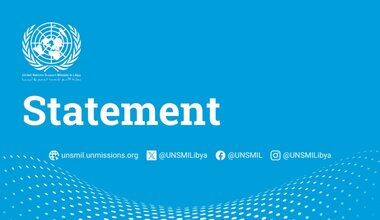Libyan Scouts Take Centre Stage as International Mine Action Day is Marked by Pomp and Speeches
The young boy scout lifted up a placard that read "Isn't It My Right to Live Like Other Children?" along with a cartoon drawing of a boy who lost a leg watching other children playing football. The marching band blew the horns and beat the drums.
Several hundred scouts, many carrying similar placards and banners drawing attention to mine risk education, stood in formation and began the march on Tripoli's seaside with the Libyan flag in the lead.
Thursday 4 April 2013 was the International Day for Mine Awareness and Assistance in Mine Action, and the event was marked in Libya by these boy and girl scouts, a drawing exhibition and official speeches for the occasion. It was the children's day to show that their efforts could make a difference.
The unseasonal hot springtime weather did not deter the scouts, who were determined that their campaigning to raise awareness about mines and unexploded remnants of war makes a difference.
"It is the duty of every scout to take part in the campaign," Mahmoud Salem Dangir, a 15-year-old from the Tripoli Scouts Regiment, said in an interview.
"On every international day we act, we launch an awareness campaign, be it about mines, human rights or AIDS. We go out in a parade, raise banners and highlight the information we have so that the media is alerted and so that people will see the campaign and absorb it," added Mohanad Al-Tarhouni, also 15.
As they set off on a two-kilometre march from a downtown square to a hotel where the official speeches were made, some of Tripoli's residents along the march route stood on windows to snap pictures. Motorists where traffic was blocked to make way for the march waved, smiled or honked. Several revolutionaries from the Supreme Security Committee in military fatigues stood outside one of their posts along the way curiously looking at the children as they marched.
A group of schoolgirls took part in the parade, one saying they were invited because their school's football team won the competition in Tripoli.
At the hotel's auditorium, Education Minister Ali Al-Obeidi spoke to a couple of hundred attendants about the threats of mines and unexploded remnants of war.
"Mines kill indiscriminately and mercilessly," he said, pointing out to statistics that show it costs about $1 to plant a mine and $1,000 to remove one. "There has to be active efforts," the minister said, adding "Libya looks forward to all parties, international and humanitarian organizations to get rid of this lethal scourge."
International Day for Mine Awareness and Assistance in Mine Action was declared on 4 April in 2005 by the 60th UN General Assembly. The day provides an opportunity to draw attention to the problem of landmines and explosive remnants of war, and national and international responses to it.
In his message on the occasion, UN Secretary-General Ban Ki-moon said eliminating the threat is a crucially important endeavor that advances peace, enables development, supports nations in transition and saves lives.
This year's event in Tripoli was marked in cooperation between the Ministry of Education, the UN Children's Fund (UNICEF), the United Nations Mine Action Service (UNMAS), the United Nations Development Programme as well as international and local non-government organizations.
Speaking for the United Nations mine action team in Libya, UNICEF's Libya Country Director Carel de Rooy pointed out that considerable efforts had taken place since April 2011 to locate, remove and destroy explosive remnants following the conflict in Libya under the coordination of the UN Support Mission in Libya (UNSMIL) through UNMAS.
He said UNICEF facilitates risk education activities, and since April 2011, 185,000 beneficiaries have been reached through risk education, a large majority of those have been Libyan Children. He added that UNSMIL, through UNMAS, supported operational planning, clearance and destruction of approximately 165,000 explosive remnants of war across Libya, as well as monitored and advised on the accounting, safe storage and control of arms and ammunition and the management of weapons.
He also pointed out that since December 2012, there were no casualties reported as a result of explosive remnants of war and that illustrates the positive and successful efforts of risk education.
But he added: "Despite this tangible and impressive progress, explosive remnants of war, unsecured ammunition, the proliferation of weapons, and the dangerous use of fireworks continue to pose a serious risk to the Libyan people - especially children."
De Rooy called for the need to continue working collaboratively on the issue to mitigate the threats.
He also appealed to the government of Libya also to continue strengthening state controls and encouraged the authorities to explore ratification, accession and adherence to international normative instruments, including the Antipersonnel Mine-Ban Convention, Protocol V on Explosive Remnants of War of the Convention on Certain Conventional Weapons, the Convention on the Rights of Persons with Disabilities, the Convention on Cluster Munitions.
A Press Release for the event said UNICEF has been working with Handicap International to develop the capacity of staff from the Ministry of Education and school teachers to deliver a school-based mine risk education programme, including information on small arms and light weapons.
"Our aim is for children to understand the risks of associated with these dangerous items and we know that posters and leaflets are an effective way of changing their behaviours," Sara Rijavec, the small arms and light weapons project manager at Handicap International, was quoted in the Press Release as saying.
 United Nations Peacekeeping
United Nations Peacekeeping UN
UN

















